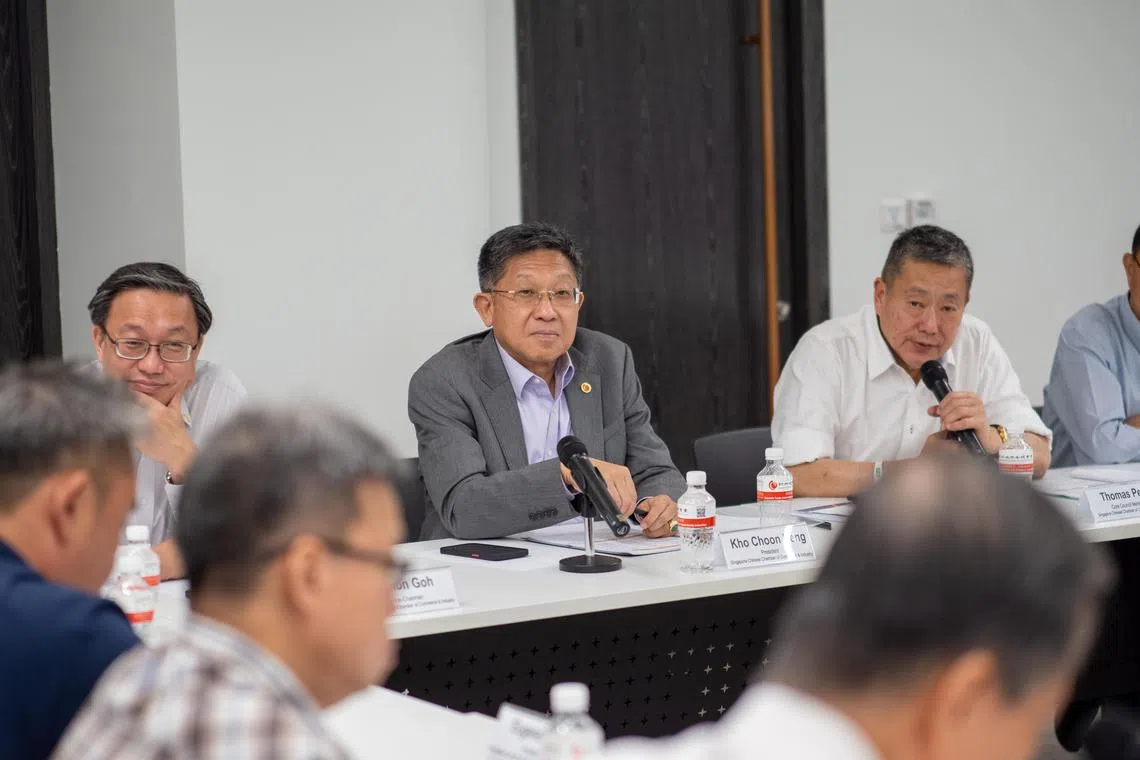More trade associations seeking help to navigate business challenges: SCCCI
Sign up now: Get ST's newsletters delivered to your inbox

SCCCI president Mr Kho Choon Keng (centre) and Mr Thomas Pek (in white), chairman of SCCCI’s trade association committee, at a regular luncheon session.
PHOTO: SINGAPORE CHINESE CHAMBER OF COMMERCE & INDUSTRY
Follow topic:
SINGAPORE - When escalating energy costs strained the businesses of its members, the Laundry and Dry-Cleaning Association sought help from the Singapore Chinese Chamber of Commerce and Industry (SCCCI) in February.
Mr Eugene Tay, the association’s president, told The Straits Times that this led to valuable engagement opportunities with government agencies such as the Energy Market Authority for advice on managing energy costs.
It included approaching new energy retailers for longer-term lower-priced contracts, exploring operations during off-peak hours, and tapping flexible pricing contracts to manage energy cost fluctuations.
The association’s members also held dialogues with the Ministry of Manpower and Enterprise Singapore to address their manpower shortages.
Another trade association that needed help was the Kranji Countryside Association (KCA). With SCCCI’s guidance, it successfully applied for funding support from the Singapore Tourism Board to transform Kranji Countryside into an eco-tourism destination for local and overseas visitors.
It also developed new digital marketing channels to help its members deliver content to its target audience, said KCA president Malcolm Ong.
SCCCI has seen more trade associations seeking its help, with a 30 per cent increase in issues raised in the past one to two years, said Mr Thomas Pek, chairman of the chamber’s trade association committee (Tacom).
About 80 per cent of the issues are complex ones that need more time to resolve, he added.
Common challenges raised include manpower shortage, rising costs and changing business trends like sustainability.
SCCCI, which was established in 1906, has close to 160 trade association members.
It established Tacom in 2017 to drive the transformation and development of trade associations in Singapore in four main areas: promoting industry development initiatives, driving capability development, catalysing cross-industry collaborations and conveying the trade associations’ perspectives, feedback and suggestions to the Government.
Tacom has 13 trade association members from different industry sectors. Its current adviser is Minister of State for Trade and Industry Low Yen Ling.
Mr Pek, who is also the owner of Tai Hua Food Industries, said that as Singapore’s economy undergoes transformation, it is “imperative that SCCCI partners and assists its trade association members to transform and upgrade, particularly those in the traditional industries, in order to stay relevant and thrive in the new economy”.
Trade associations sometimes also band together to seek collective help. For example, with feedback from the Singapore Chinese Medical Union, Singapore Chinese Physicians’ Association and Singapore Chinese Druggists Association in January, SCCCI helped to aggregate industry demand to implement nutri-grade labelling, and connected the associations with the Singapore Accreditation Council and various product testing labs.
This lowered the cost of product labelling, and helped to reduce the regulatory compliance costs of merchants in the traditional Chinese medicine trade.
Physical retailers and food and beverage (F&B) businesses also sought assistance over the competition they faced from their online counterparts, whom they said could bypass safety and hygiene regulations.
SCCCI facilitated meetings between the Ministry of Trade and Industry and the affected trade associations, namely, the Singapore Houseware Business Association, Promotional Products & Giftware Association, Restaurant Association of Singapore, and Singapore Bakery & Confectionery Trade Association.
The result: They were assured that the Government would strengthen enforcement actions against online retailers and F&B operators that breach safety and hygiene regulations.
Also, there will be an education process for the larger-scale online businesses to transit to licensed shared or regularised facilities.
SCCCI is also working to bring businesses on board sustainability, digitalisation and capability development.
It initiated the Sustainability Alliance in October 2022 with two trade associations – SGTech and the Sustainable Energy Association of Singapore – to develop customised sustainability road maps for the different industry sectors of participating trade associations.
It will drive and educate local enterprises on the benefits of adopting sustainable practices, reducing carbon footprint and improving energy efficiency.
SCCCI brought together the Container Depot and Logistics Association (CDAS) with SGTech to embark on a CDAS industry digitalisation project around December 2022.
It also helped the Singapore Pawnbrokers’ Association to collaborate with SGTech to digitalise the business processes of its members in March 2023.
To encourage upskilling, SCCCI also pioneered the “TA 101” course, a foundational training course dedicated to trade associations’ secretariat staff, supported by SkillsFuture Singapore and Nanyang Polytechnic.
Since its launch in August 2022, a total of 47 secretariat staff have been trained over three successive runs of the course. Two new courses relating to government advocacy skills and industry research will be introduced in 2023.
Said Mr Pek: “Going forward, we expect to be helping more trade associations navigate business challenges and resolve their problems in an increasingly volatile environment.”

